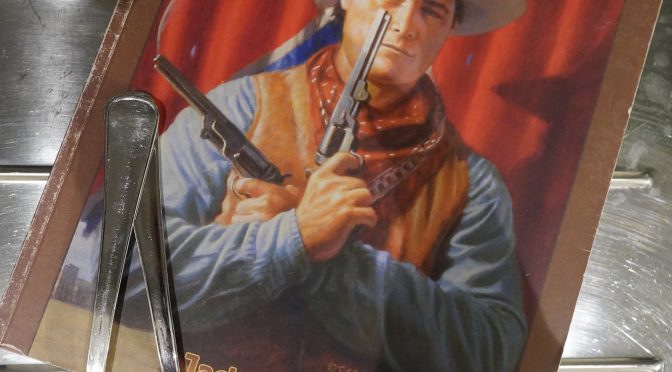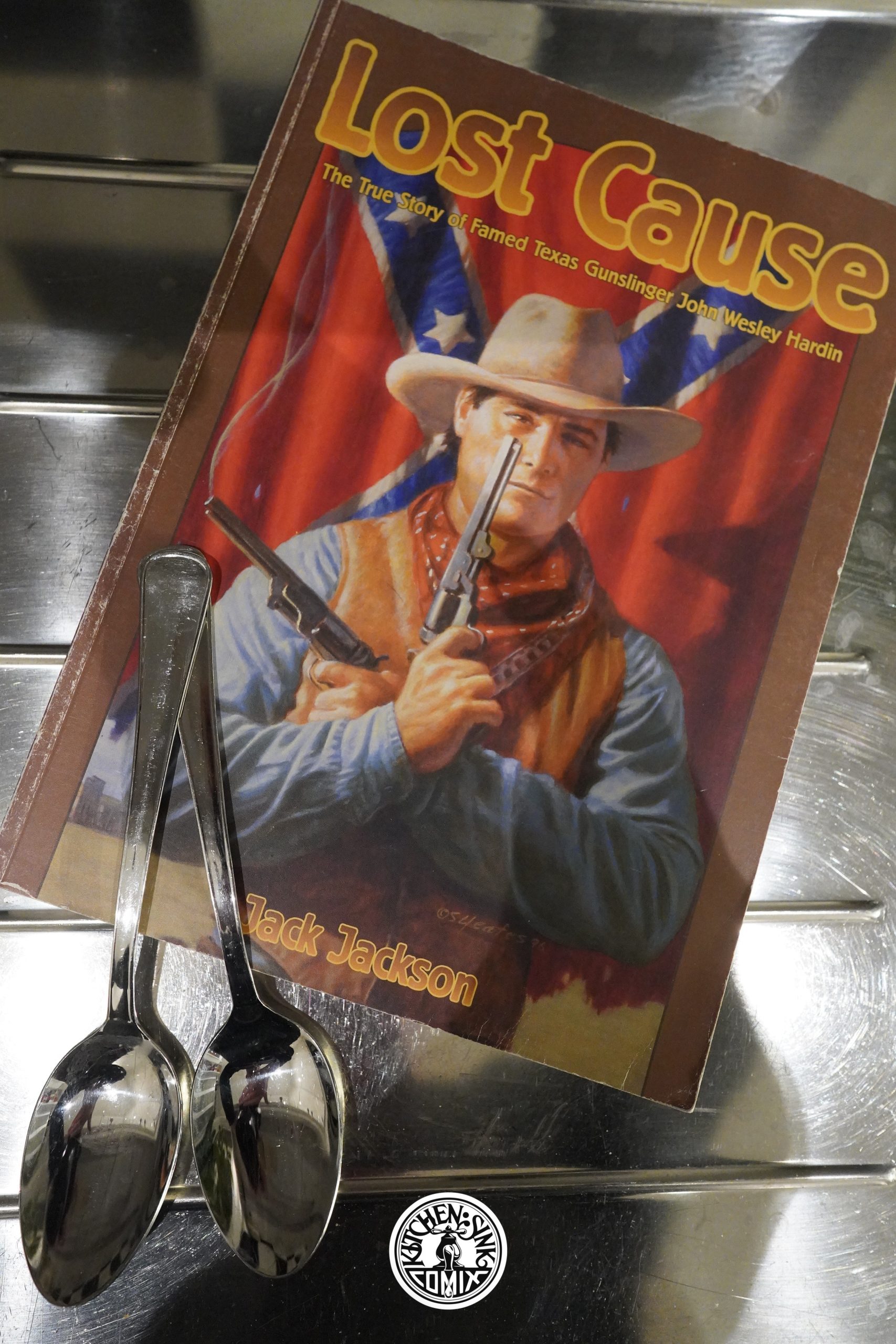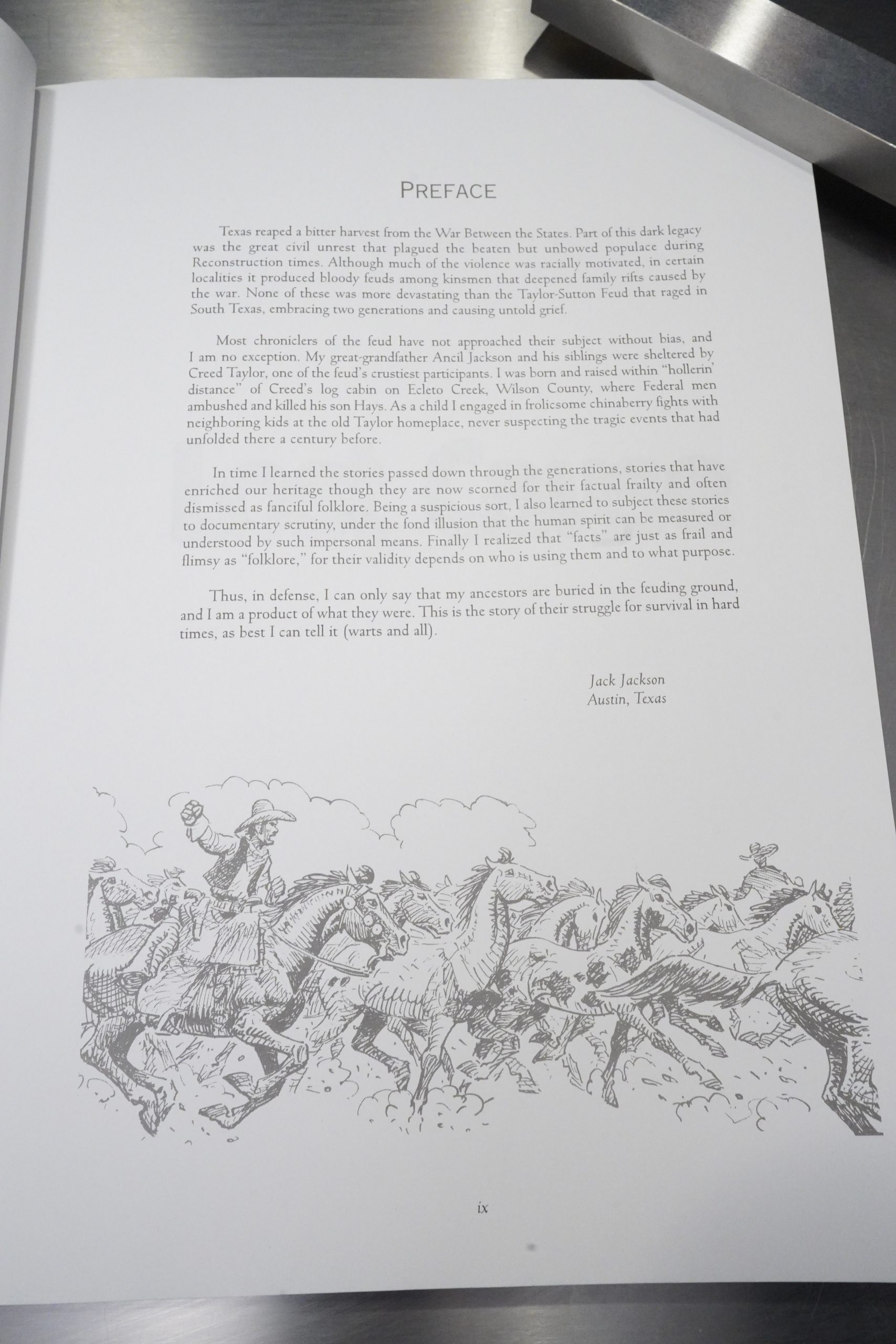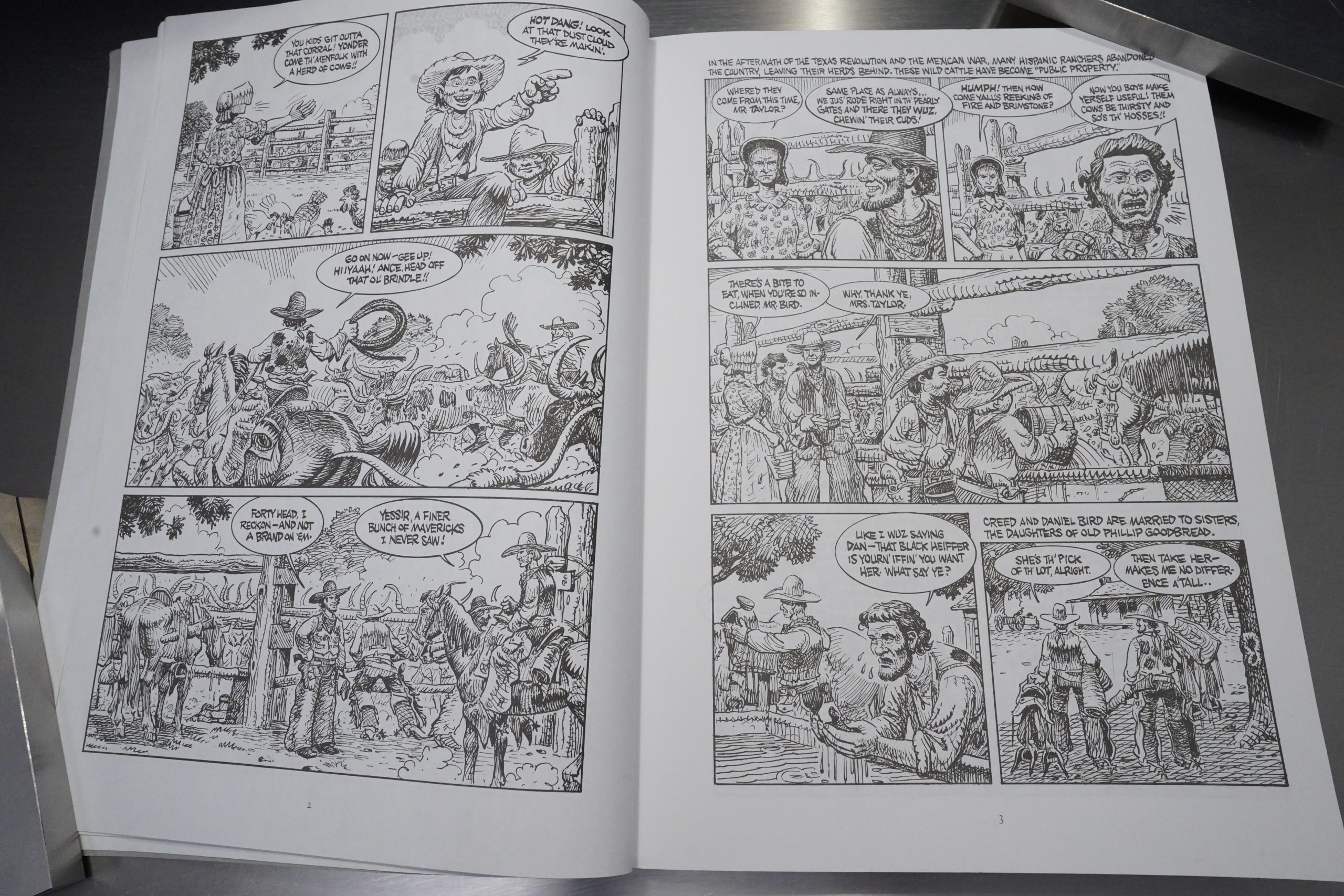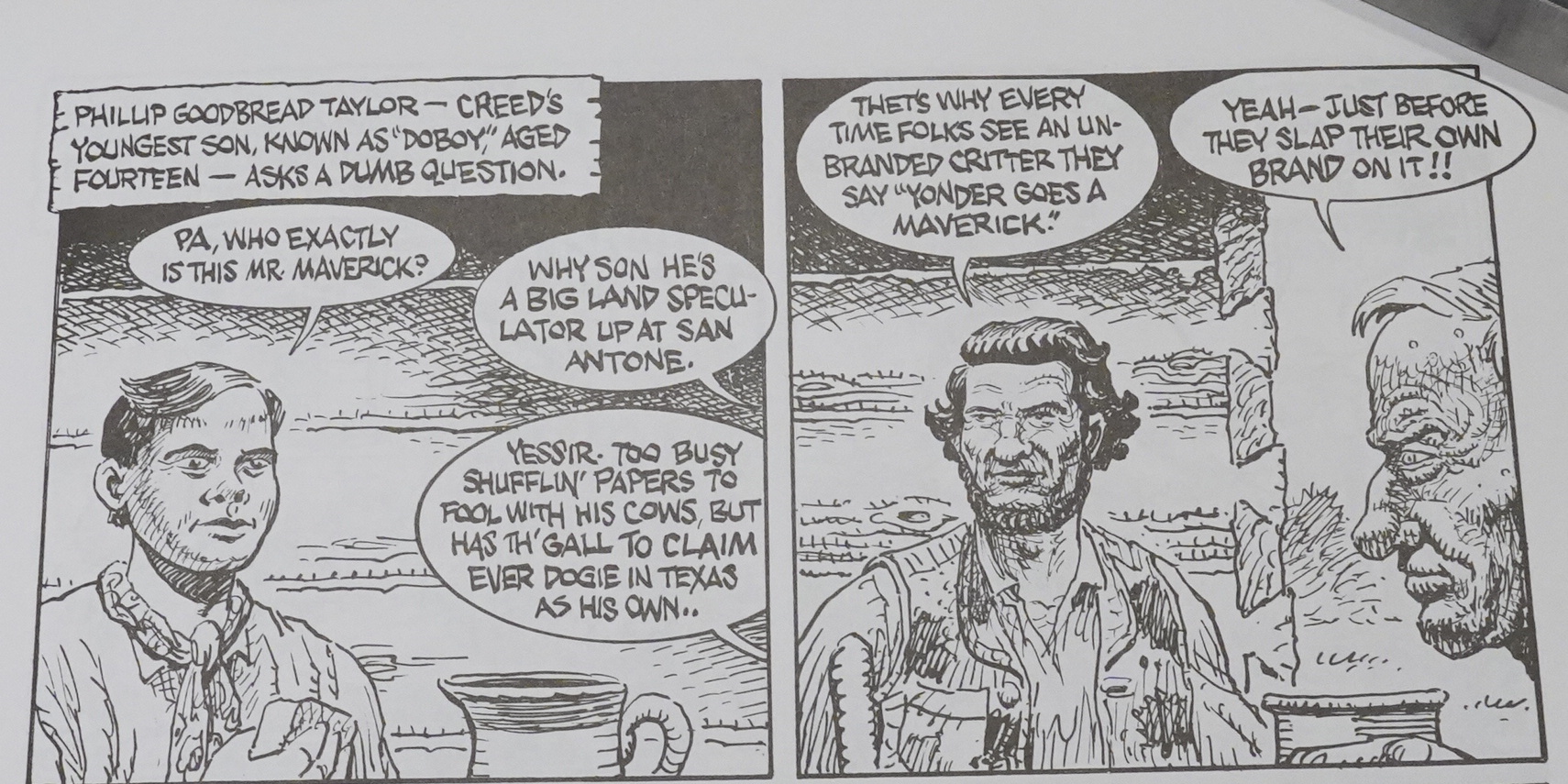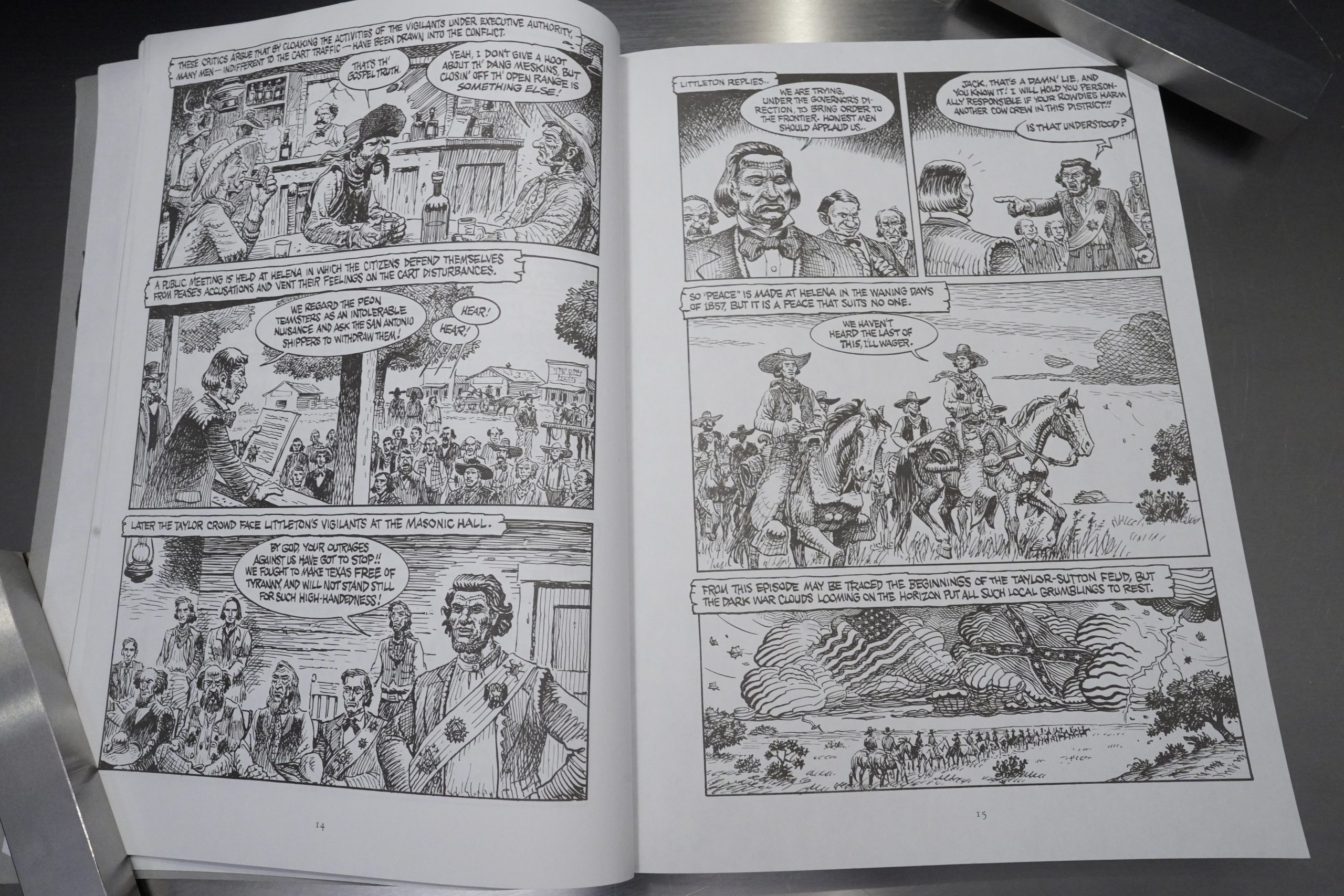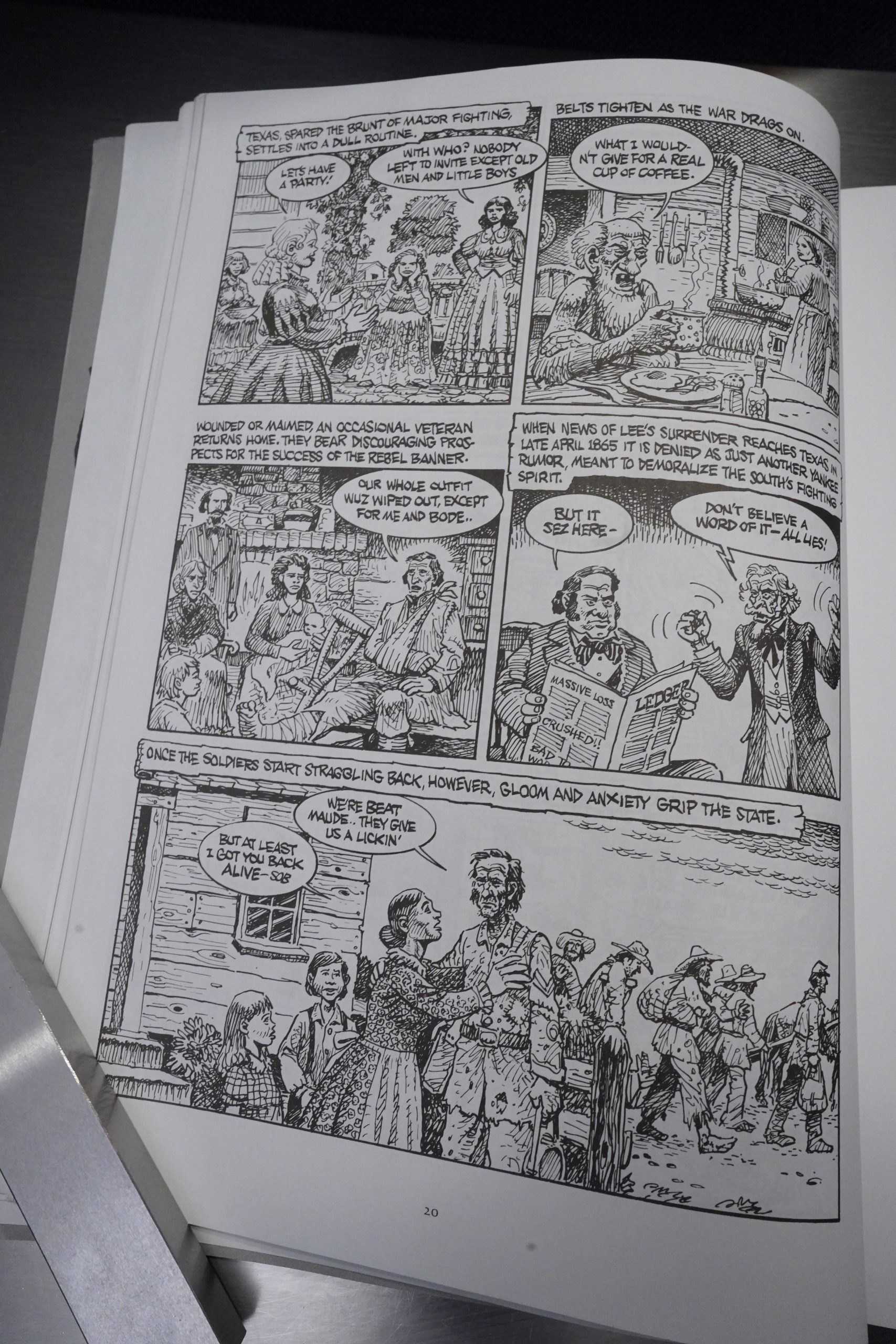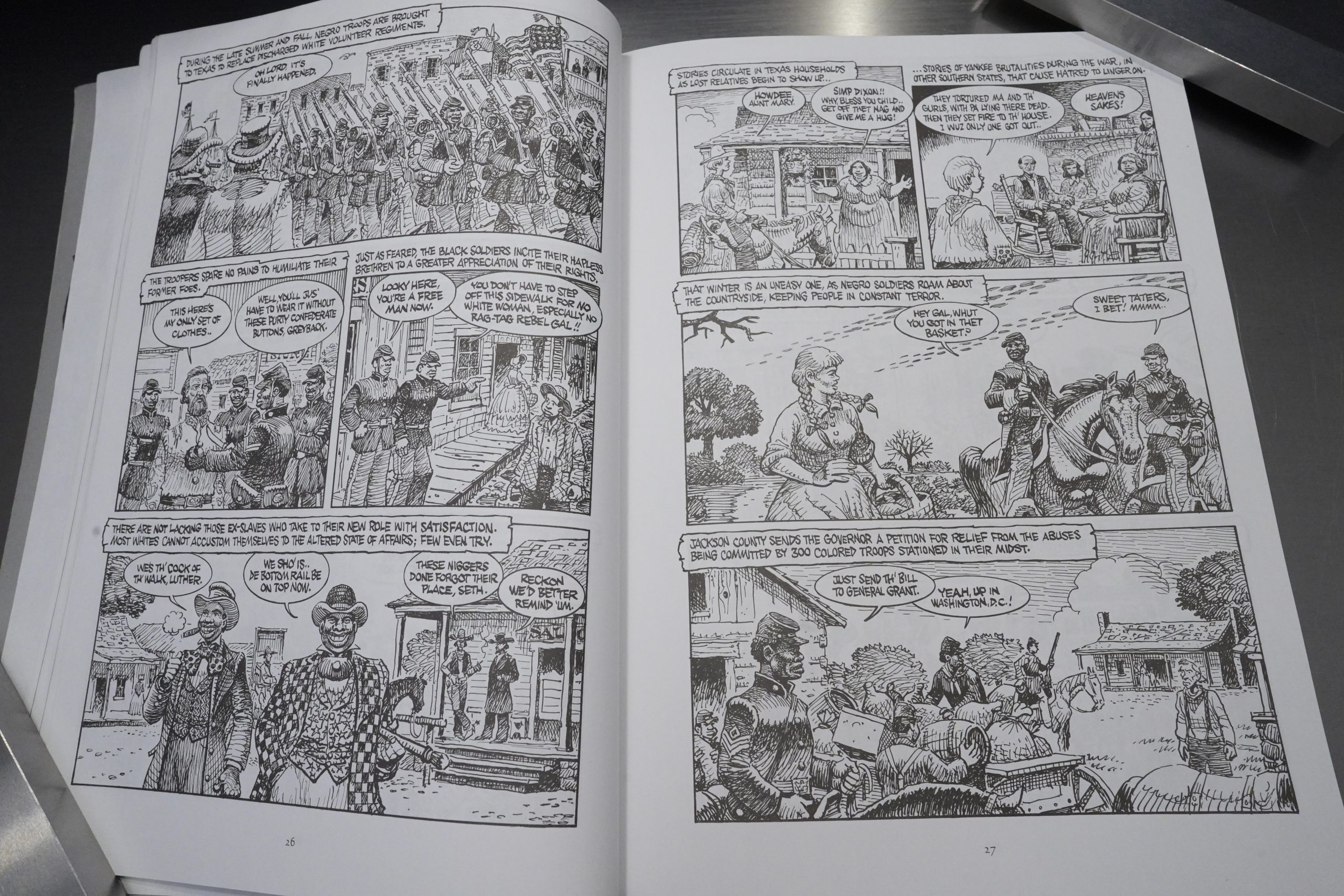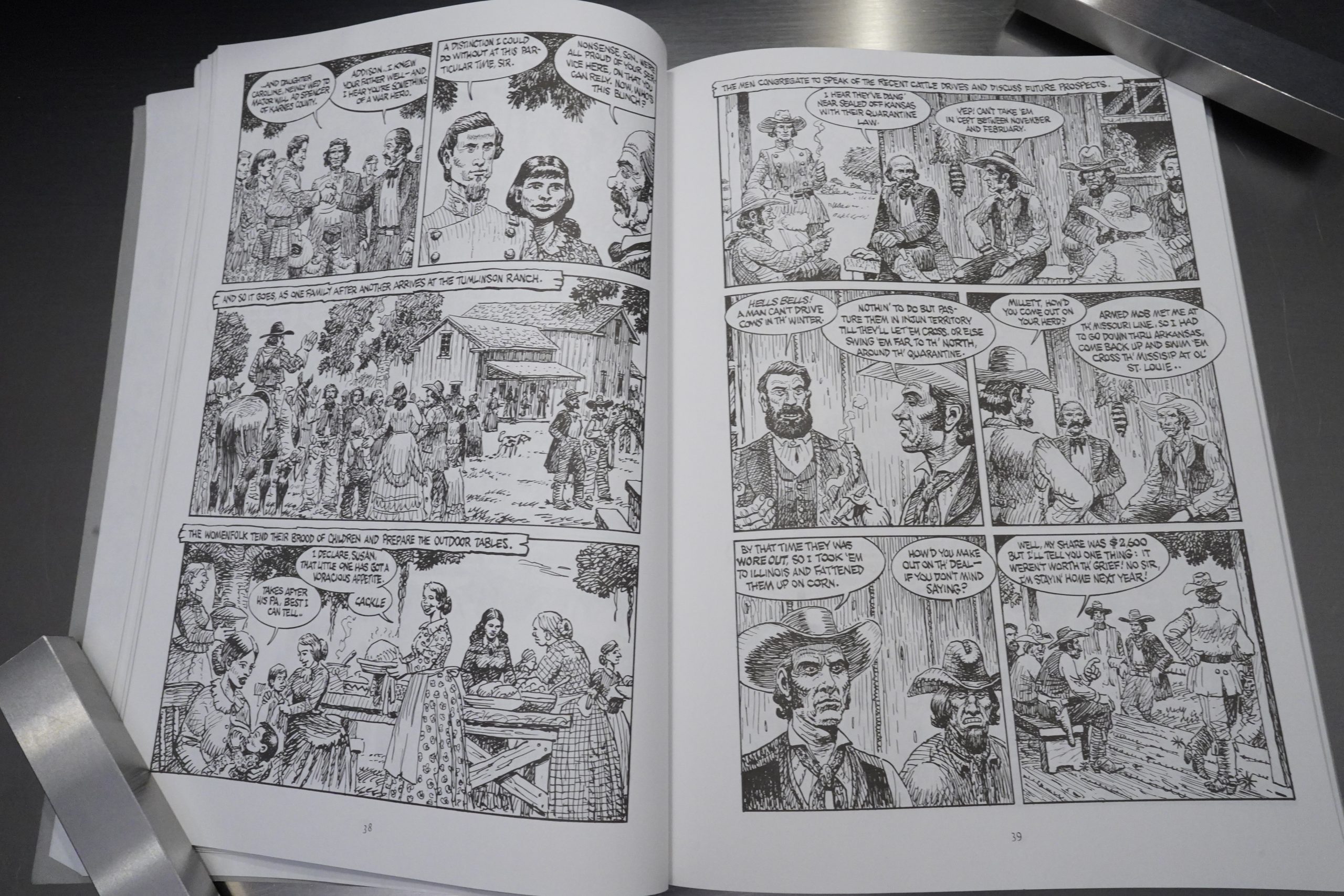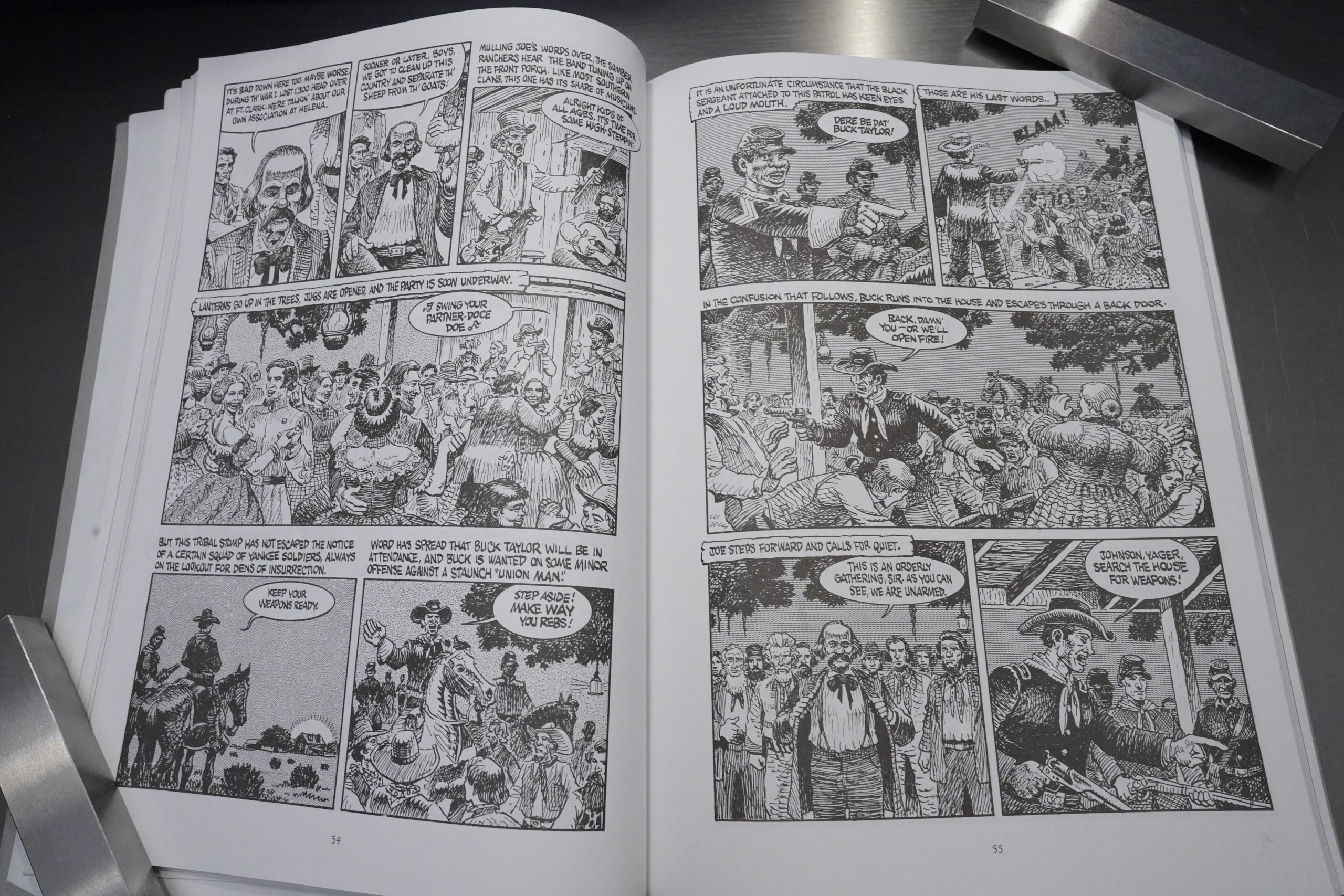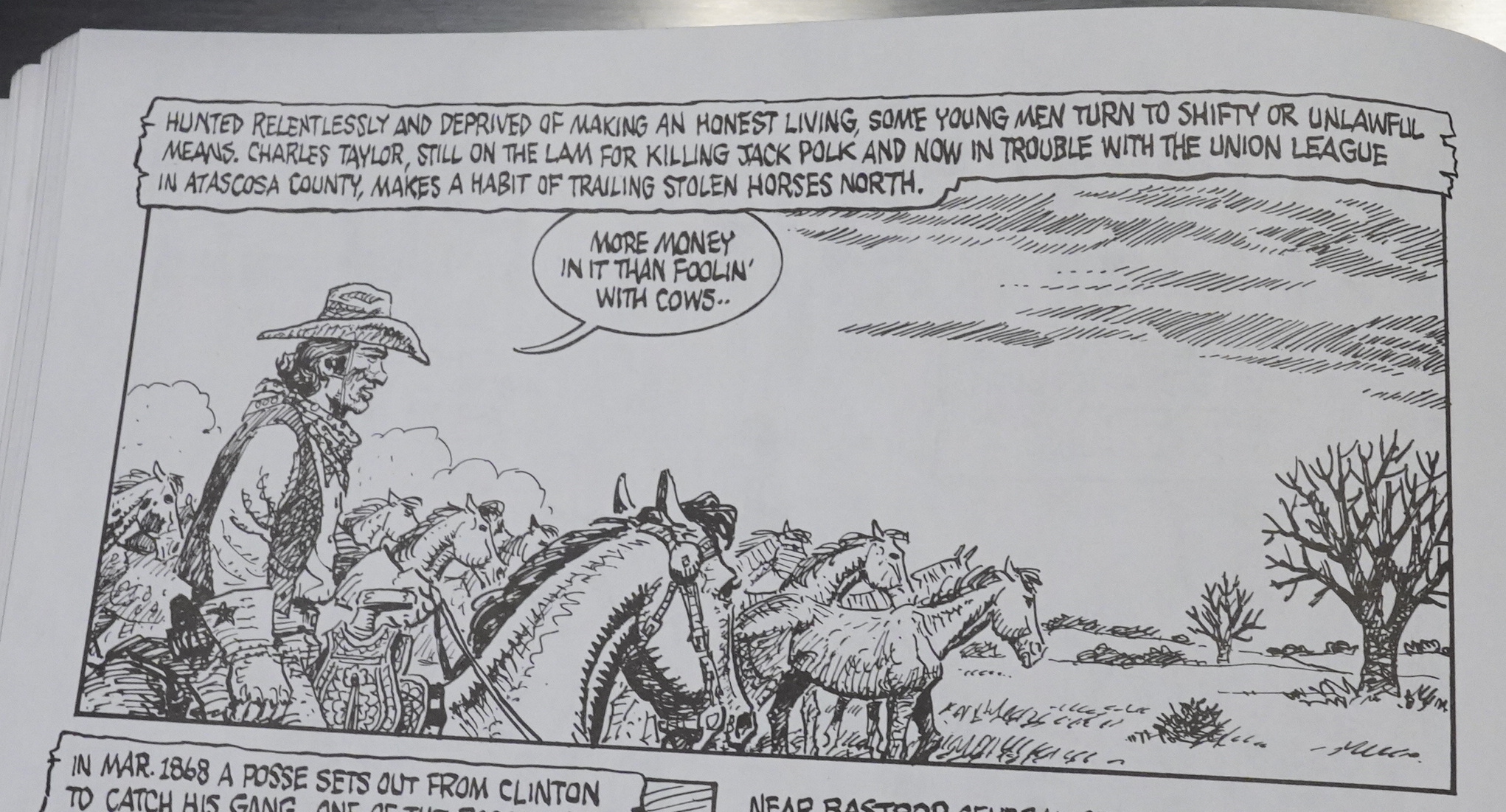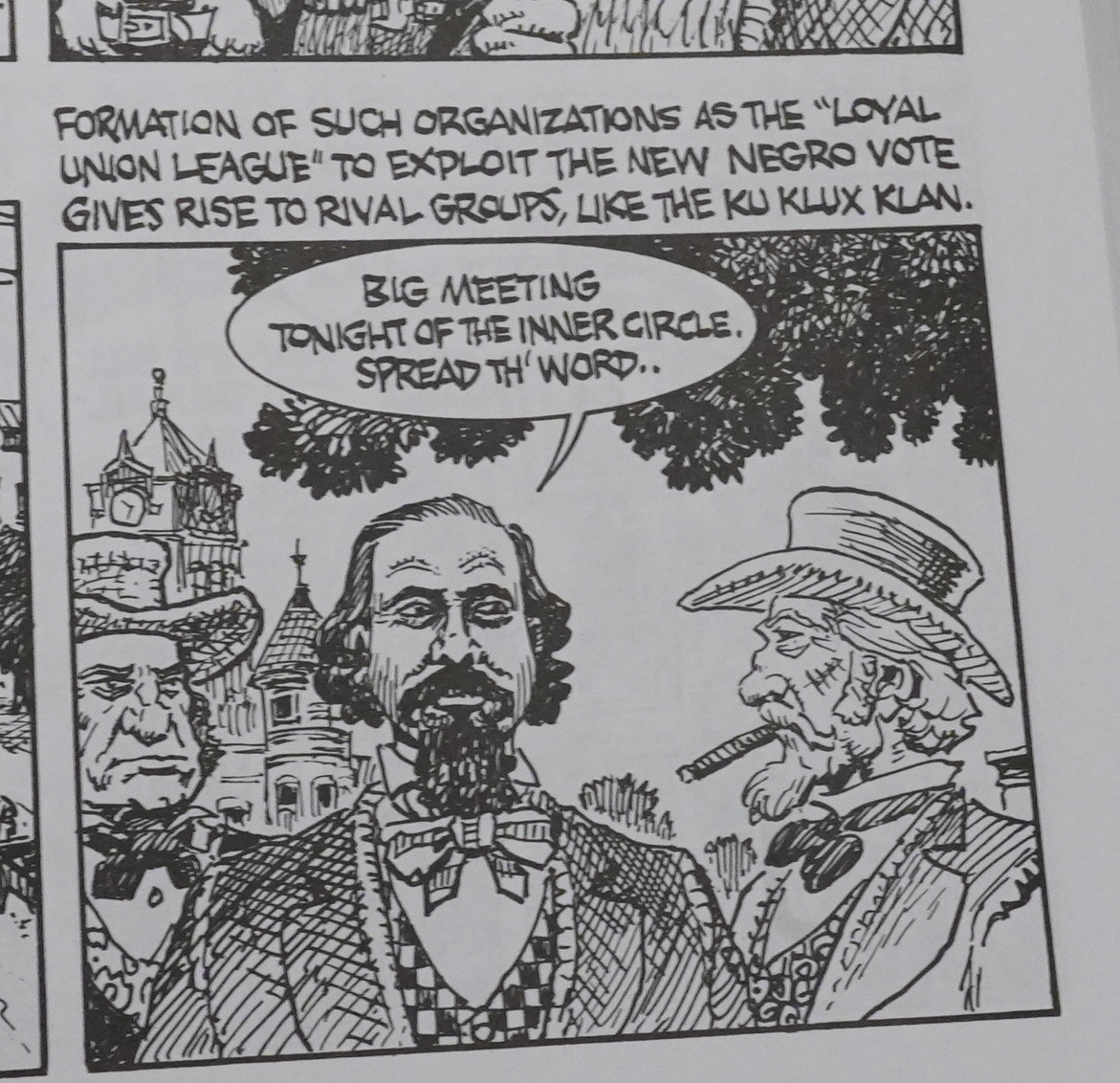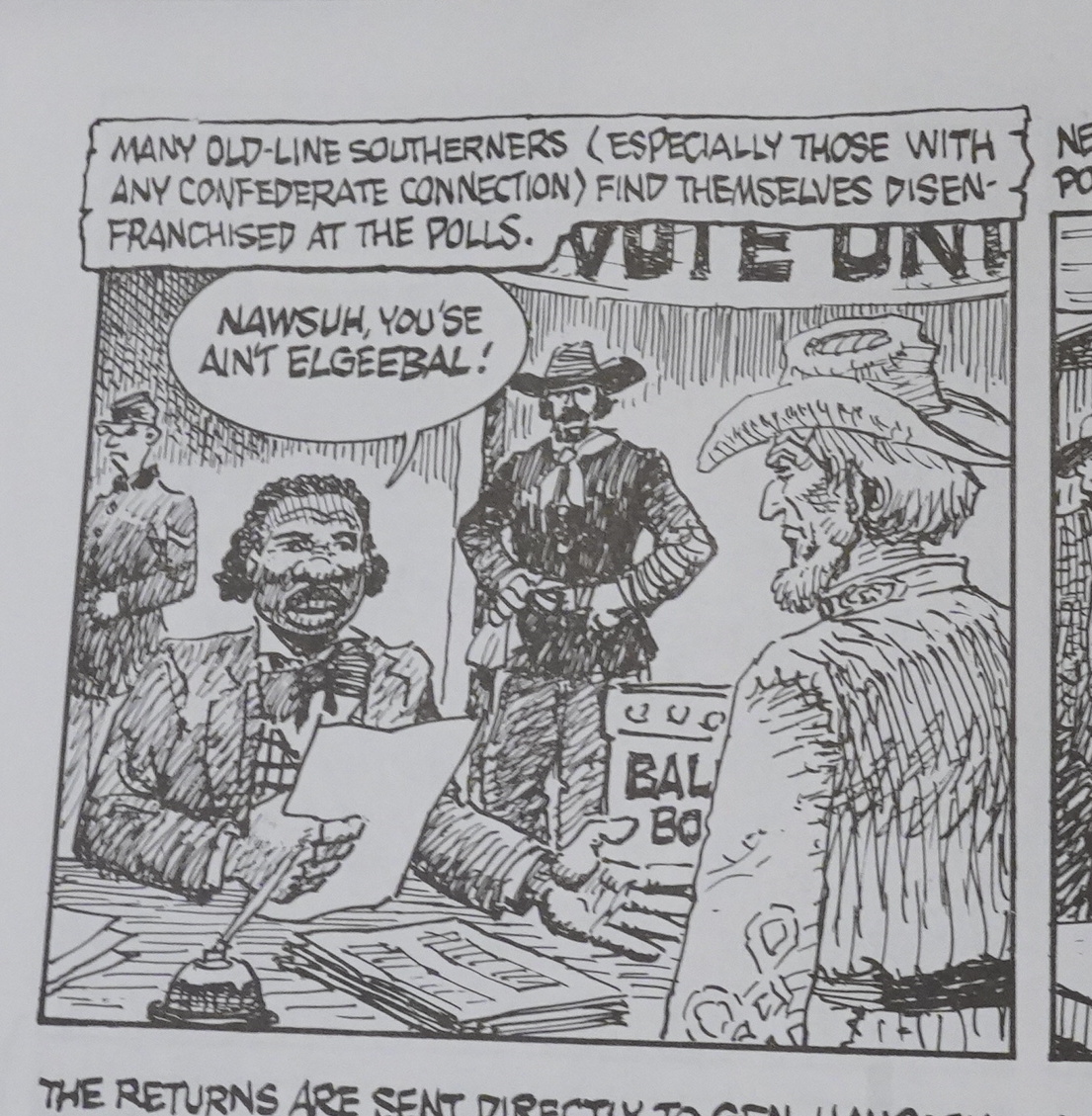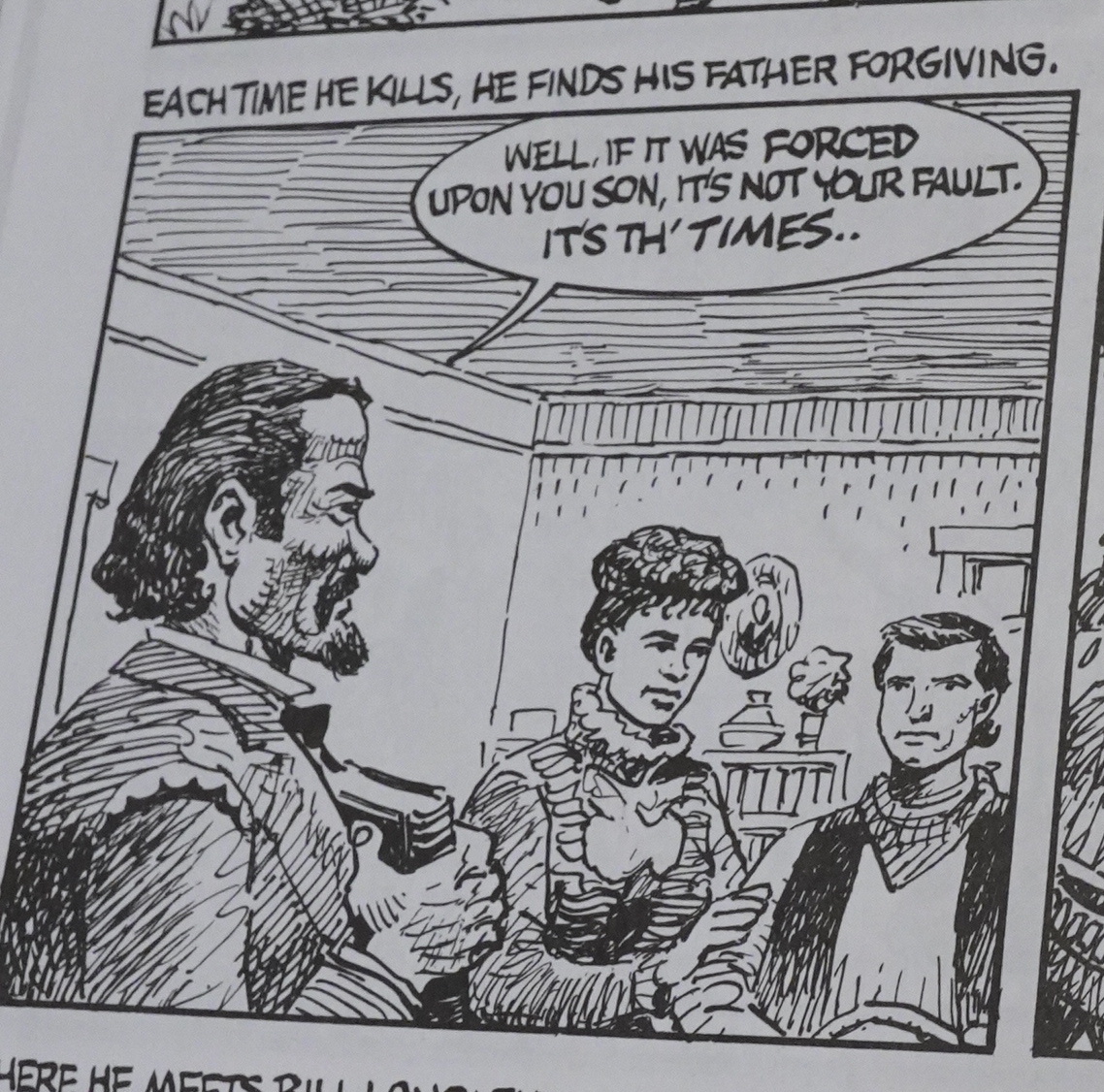Lost Cause: John Wesley Hardin, the Taylor-Sutton Feud, and Reconstruction Texas (1998) by Jack Jackson
I’m not quite sure what the real title of this is — the cover says “Lost Cause: The True Story of Famed Texas Gunslinger John Wesley Hardin”, but the indicia says that more accurate thing in the link above.
Anyway, I’m sort of a Jack Jackson fan (or Jaxon, as called himself back in the day), and have been since before I was a teenager. I’m not quite sure why, because his obsessions are mostly not mine. That is, I don’t really have any particular interest in the history of Texas and stuff.
We start this book with an introduction where Jackson explains that this isn’t going to be an… objective… telling of this story.
I think part of Jackson’s appeal to me is just how gnarly his drawing is. His figures are really stiff in an ECish way, while his rendering is down and dirty, and the juxtaposition just makes his pages look interesting. (I guess the rendering isn’t totally dissimilar to Jean Giraud’s western comics, especially his early 70s one, but I’m assuming neither was influenced by the other, but had a parallel take on drawing western stuff.)
Oh, is that where the term “maverick” comes from? Jackson is, as ever, very edumacational.
The material here could be tough sledding — there’s so many names, factions and events that somebody like me (who has zero recall for names) could easily be totally confused all the time. But somehow it works. Jackson manages to imbue these people with at least some character to allow the reader to distinguish just who is killing who this time.
But there’s a lot of this recaps of current affairs, especially at the start of the book, and I can see how many people would just rather not.
The US civil war takes place — and Jackson mercifully skips the entire thing. We only get the aftermath, which is a smart choice.
The aftermath told from the view of the white Texans that we’re following, that is.
Jackson wisely has many longer sequences in between all the infodumping where people can actually interact with each other; more like a traditional comic book and less like a lecture. Which, again, is a smart move, because it allows you to relax a bit before the next onslaught of names, names, names. (And also get to know the characters a bit.)
When Jackson said he wasn’t approaching this subject without bias, he wasn’t joking. How would you sum up these two pages, for instance? A reasonable summation would be “cops ride up to a party to arrest a guy wanted for murder, and that murderer kills one of the cops” would be a reasonable one, right? But that’s not how Jackson frames this. “It’s unfortunate” that the killed (Black) cop has “keen eyes and a loud mouth”.
Yeah, mm-hm, right.
And what about this guy? Yes, Jackson says he’s a horse thief. But what about that framing?
And why was the Ku Klux Klan started? Because of “rival groups” who presumably were really bad, right?
And while Jackson has many of the people speaking in broad dialect, he reserves the most illiterate talk to the few Black characters that appear.
What I’m saying is that this book is fucking racist.
Now, Jackson has previously done books seen from the point of view of Native Americans (Comanche Moon) and Mexicans (Los Tejanos), so perhaps he’s just hewing closely to the viewpoint of the fucking racist white Texans he’s depicting, but reading this book, it’s pretty relentless. Is there a single slightly sympathetic Black character in this book at all? Are there any murders or crimes done by the Taylors that Jackson doesn’t weasel word his way around? (I mean, he does show them killing a lot of people, so you might say that that’s him not trying to weasel out of anything, but it’s constantly done in a context that explains why they’re doing their murders.)
Right. But remember John Wesley Hardin, the man on the front of this book? He does show up here and there, but his part in this story doesn’t really start until the book is two thirds over. The book is mostly about how the Taylors are hunted (for very good reasons!) by a shifting state of law enforcement, and Hardin becomes involved with that.
But the cover isn’t a total lie: We do get a lot of Hardin stuff in the last third of the book.
Many of Jackson’s books veer towards incomprehensibility as they go along. That thing about the silver slug? Man. Jackson is on his best behaviour here, plot wise — it’s all structured well and keeps on being exciting (and readable) till the very end.
The Comics Journal #278, page 27:
Criticism was something to be expected
because history is open to interpretation and
people often have a vested interest in seeing
their version of the facts presented. Folks in
Texas take their history seriously, acknowl-
edged Jackson, but it was a personal attack
that gave him the most grief in 1998, when
he published his book Lost Cause, which de-
scribed the Reconstruction period in Texas
following the Civil War.
priest recounted, “When he started that
book, he said, ‘I’m going to catch hell for this
one.’ He said, ‘l ‘ve done the Indians and I’ve
done the Mexicans and I’m fixing to do the
white folks. It’s a time Of American history
that they just leave out Of the books, because
it was so damn ugly.’ He said, ‘I’m going to
try to give it as even a hand as I can. I’m going
to put all my sources and put all my footnotes
andjust hope for the best, because I got to do
it. The Story hasn’t been told.'”
The Austin Chronicle ran a review by Mi-
chael Ventura on Sept. 21, 1998, tearing Lost
Cause to shreds. The reviewer accused Jack-
son of racism in his treatment of blacks, and
trashed graphic novels as a serious literary
form. He even suggested Jackson’s weapons
were historically inaccurate. As damaging
as the false allegations was the subsequent
refusal of the editorial staff to allow Jackson
to publish a rebuttal of those charges in their
newspaper.
“That was idiotic on their part,” said
Priest. “He just didn’t know as much about
rifles as Jackson did. And the crap about a
graphic novel? They didn’t even know what
a graphic novel was. I think they were horri-
fied by the intensity Of the Story that he told.
I think they killed the messenger. think
they just couldn’t get over the impact of that
story.”
Fellow cartoonist Mack White offered
to help Jackson mount a defense. “He felt
grievously betrayed by the ChronicVs staff,
whom he had thought were his friends. The
day after the review appeared, Jack called
me. He was beside himself with anger. He
was considering legal action, at the very least.
If it had been an earlier era in Texas, I think
Jack would have strapped on his six-guns,
marched down to the Chronicle’s office, and
called out both the editor and reviewer to
receive a powerful dose of frontier justice.
He was that mad. I suggested an alternative.
Publish your rebuttal on the Internet. Jack
didn’t have Internet access at that time, so
he gave me the 10 or so handwritten pages,
which I typed and posted On the old ‘co-
mix@’ e-mail discussion list. This brought
the matter to the attention of the larger com-
ics community outside Texas, causing a great
many people to inundate the Chronicle with
letters defendingJack.”
The Comics Journal further defended him
by publishing an interview on the subject in
issue #213 in July of 1999, where he stated his
case to publisher Gary Groth. “When you do
a book, you have to take a perspective, 0K?
My perspective in this case was from the side
of the white Southerners during the Recon-
struction period. Basically, I saw the book,
because it is about a feud, as dealing with
white-on-white violence, none Of which Ven-
tura even mentioned in the review. He only
saw the white-on-black aspect of it, which in
fact is a very minor part of the book. I am not
trying to tell the story of John Wesley Har-
din from the black point of view. And I’m
not even interested in what happened to the
blacks except insofar as it was a contribut-
ing factor to the overall violence of the era in
terms of military rule and Reconstruction. So
I am takingprobably the most unpopularper-
spective for the book imaginable. And that is
the politically incorrect idea that you can tell
a story about racists sympathetically. You see
what I’m saying? Because they were racists,
as Ventura points out, but they were also hu-
man beings. In other words, racism was just
part of the mind-set of that day and time. So it
just seems mind-boggling to me thatyou can-
not take any perspective you deem appropri-
ate in the story you’re telling. I think that an
artist should have that latitude, in terms of
putting together his story, and deciding on a
perspective that is key to all that follows. And
I say, hey, I’m not telling this story like Alex
Haley would tell it I understand and appre-
ciate his approach, but it’s not my cup of tea.
Roots come in different colors. Now, is it ‘in-
trinsically morally questionable’ to attempt
a story from the oppressor’s perspective? I
don’t know. People are just people, and few
are perfect. Yes, white Texans of Reconstruc-
tion times were racists (as we now define the
term), but they also had the same hopes and
dreams of any era. Their lives had some re-
deeming qualities, and I don’t think it’s right
to sweep them into the historical dustbin be-
cause they did politically incorrect things by
current moral standards.
Jackson’s ultimate response to these
scurrilous charges resulted in a privately
published book calledJackson•s Rant, which
included his thoughts and copies of letters
from his supporters. Only 20 or so copies
were distributed to close friends.
It is indeed a pretty harsh review:
Jackson is a racist because he finds these qualities only in white people. Almost without exception, he presents blacks as oafs — exactly as blacks were presented in the old-timey movies that are the model for his dialogue. Amazingly, nearly every drawing of a black man is the same drawing. Same bone structure, same expression, same lips. His whites, by contrast, are differentiated. This is more than a simple gaffe. This is how Jackson sees. It’s also a necessary function of his storytelling — for if he drew blacks as humanly as he drew whites, then the racism of the whites would be harder for the reader to take.
[…]
In this panel, there are two blacks in the foreground — both with the same generic face — at the voting table. The black election official tells the black voter, “Mark it rat der — then come back in an hour and do it again!” “Then I gets my bottle?” the voter asks. There’s nothing racist in writing dialogue in dialect, no matter what the politically correct crowd says. Both races speak in dialect in Jackson’s work, and it’s appropriate. Nor is there anything racist in documenting election fraud — he shows election fraud on the part of the whites too. But with the whites Jackson is careful to show that there were many who were against such fraud. Yet this is all we see of black attitudes toward voting. Jackson gives the clear impression that this is how blacks took to their new and long- delayed franchise. Which is a lie. There is massive documentation that most freed slaves were deeply serious about their freedom — many, so very many, died, murdered, as proof of their seriousness. To suggest otherwise, in a work touting itself as history, is disgusting.
Jackson is interviewed in The Comics Journal #213, page 85:
GARY GROTH: talk about Lost
Cause and the controversy aeated by the
review by Michael Ventura in the Austin
Chronicle.
JACK JACKSON: I was pretty upset
about it, and didn’t really have any way
to deal with it, except appeal to the
Chronicle to let me defend myself, which
they wouldn’t do. And that was even
more aggravating than the review itself.
GROTH: they wouldn’t give you the
same kind Of space that theygaye I found
to be pretty contemptible. Tie retietvran in
the Austin Chronicle on September 18,
1998. there any backlash towards you,
asfaras you could tell, after he called you and
your racist?
JACKSON: No. On the contrary, people
were nsing to my defense — calling me,
writing me, and trying to e-mail me—
but I’m not on the internet, so a friend
of mine who was passed these things
along. I was amazed at the issues that
were being discussed on these posts, you
know? They were going to the nitty-
gritty , and halfofthem hadn ‘t even read
the book yet. They werejust lookingat
the review itself, and the ignorance that
it manifested.
GROTH: so didn’t catch any moreJlak
because of the review?
JACKSON: Oh. absolutely not. No, it
very supportive, and that’s what
finally made me realize that hey, there’s
no point in trying to dodge this, you
might as well grab the bull by the horns,
you know? I don’t want to use the term
“milk it,” but controversy sells books.
So if this guy wants to label me a racist,
sure, let’s talk aboutit. Consequently, I
was going to book-signings and discuss-
ing the racial aspects of my book. For
example, the governor’s wife every year
throws a thing down at the state capitol
called the Texas Book Festival, and I was
an invited speaker on a panel on John
Wesley Hardin — and guess what came
up? The review. So I figure there’s black
people sitting in the audience, and you
just have to deal with it, once somebody
decides that your work is racist garbage.
That’ s basically what the guy was saying,
that bst Cause is gomg to pervert and
tw•ist the minds ofinnocent young chil-
dren, and he sees himself as their savior,
as it were, by denouncing my work. To
say it blind-sided me would be an un-
derstatement, because as you know, all
my previous work had done just the
opposite. It had tried to tell the story of
“the neglected historical others, ” as Rusty
Witek would call them. And simply
because I wanted to do a book and tell
the story from the perspective of the
be your social equals. So you had these
pockets of resistance, which I think is
natural in any similar situation. Even
worse here. And violence, of course,
was a necessary aspect of this transitional
period before the kinks were worked
out. Hell, they’re still not worked out.
But you can imagine in those days what
the situation was like. The difficulty
came mainly with the young men, the
young-bloods, those who weren’t old
enough to have taken part in the Civil
War. They had not experienced all of
the obscene things that go on during
war. They’re sitting around listening to
their older brothers, cousins, and uncles
talk about them, and they kind Of saw
themselves as the champions of this life
style which all of a sudden is gone.[…]
JACKSON: Well, the guy needs glasses
very badly, and several of the people
whose letters the Chmnide did publish
pointed this out, that there is as much
differentiation in the black people in the
book — because I’m working from
photographs, forheaven’s sake—as there
is with white people. But the reviewer
evidently did not notice these. He
thinks that because my blacks have flat-
ter noses and larger lips than my whites,
that these anatomical differences are
somehow an insidious plot on my part
to dehumanize thesepeople. Gary, he’s
saying that I’m operating on exactly the
same level as the Nazi artists in Ger-
many.
GROTH: Right, nght.
JACKSON: Those artists/cartoonists Who
depicted the Jews as squat. fat, little
hooked-nose subhumans to prepare the
German population for the idea that
they should be exterminated. He’s say-
ing that I’m doing the same thing, and
that by depicting my blacks in this fash-
ion, I make the white violence against
them more acceptable. Hey, man, that’s
a heavy charge. And it is notjustified by
the artwork. Ifyou look at it, you will
see these people come in differentshapes
and flavors like the white folks.
GROTH: I didn’t detect that the blacks u,ere
any more caricatured Within your style than
the udlites.
JACKSON: This is what is happening:
I’ve never seen a single bit of art-work
that Michael Ventura’s ever produced,
yet he claims to be an artist in his review,
and he is not even perceptive enough to
note the differences in the people that
I’m drawing. And I wasjust floored by
that and many of his other accusations.
I’m not an ignoramus. This was not
kind ofa happy-go-lucky, “Let’s try to
draw these subhuman Negroes so that
everybody will think that they got what
Was coming to them,” sort of thing.
Ventura’s write-up was just a litany of
putdowns — everybody who read it
said that it was the most bitterkind Ofso-
called review they had ever read in their
life and that it really amounted to a
personal attack, a smear. I certainly wasn’t
prepared for it. So like I said, it put me
in a state ofmind where for like a couple
of weeks, I didn’t even want to do
anything, you know? Why bother? If
this is the kind of response that you get
to something that you slaved on for a
couple Of years… It really did take the
wind out ofmy sails, Imustsay. Andhe
later defended himself, because evidently
he had been getting a lot of letters and
feedback from people himself.
GROTH: where did he defend himself
JACKSON: He has a weekly column
called “After 3 AM,” or “Midnight
Hour,” or something like that. I don’t
know ifhe lives here in Austin or in L.A.
I know that he bounced back and forth
for a while, trying to become a screen-
writer out there, and had no luck at it.
One Ofhis projects, as it turns out, was
a screenplay dealing with John Wesley
Hardin, which nobody wanted. I think
that when he saw my book, a lot of
something — antagonism — came into
play. Ijustdon’tknow. I’venevermet
the gentleman, who, I understand, hails
from the Bronx.
Well, that explains … er… it. So basically, there was one negative review of the book (which basically had the same response I had, apparently), and then everybody went apeshit trying to defend Jackson, sending letters to the newspaper etc.
The Comics Journal #213, page 89:
So to me there’s no “moral con-
flict” in humanizing your subjects, be
they scumbags or saints, and I don’t
think the goals of art are incompatible
with such an approach. Ifthe story has a
compelling ring of truth, it’s art, and
political correctness can take the hind-
most.
GROTH• Note, have been criticized, in
Lost Cause, being a bit all over the map,
because it’s not only about John Wesley
Hardin, it’s also about the Taylor-Sutton
Feud, and there’s less one central character in
this book ‘Iran there is in say, Los Tejanos.
about.
Did you feel that scattered?
JACKSON: No, not really. Part ofthe
problem comes from the fact that the
editor there at Kitchen Sink wanted to
use a different subtitle on the cover.
Something about “the story of famous
gunfighter John Wesley Hardin”. Soa
lot Of people saw that and bought the
thing thinking that they were getting a
full-fledged book about the life of John
Wesley Hardin. Actually, I’m not inter-
ested in him except in terms ofthis feud
that I’m writing about, and the era itself.
So I think some people were disap-
pointed, because the “main character”
doesn’t show up until deep into the
book. But ifyou look on the title page
itself, you will see what the book is really
about.
GROTH: I noticed that.
JACKSON: That’s misleading hype, but
I don’t feel like I should be blamed for
that. I understand that when a publish-
ing company does a book, they want to
market it on the basis ofname recogni-
tion, via the Bob Dylan song, and the
Time-Life blurb about him being so
mean that he shot a man for snoring,
blah blah blah. True. the book has sort
ofa “castofthousands.” And I guess that
that’s discombobulating, if you’re ex-
pecting a very focused story told just
from one individual’s experiences
throughout. But I didn’t really see any
other way I could deal with it, because
this one person is not there all the time.
Well, that’s chutzpah for you.
Ron Evry writes in The Comics Journal #213, page 91:
This is part and parcel what the Texas
revolutionaries were after: the right to
grab whatever they could from what
they perceived to be a vast, free-for-all
country. While not outwardly men-
tioned in the comic, the breed of men
that Jackson writes about didn’t have
noble motives to create a democracy in
Texas, but were empire builders (of
course, this did not stop the Texans
from adopting the outward pretentions
of democracy, and Jaxon often depicts
citizens dressed in formal clothing and
making public speeches). Much is made
in the beginning of the book about
ranchers and cowboys fighting and kill-
ing each other for the right to take
unbranded (and sometimes branded)
cattle roaming freely on the range, The
cowboysjoked about rounding up ” Mr.
Maverick’s” cattle (a reference to the
businessman who claimed all the mil-
lions of free cows in the state from an
office somewhere), providing a popular
nickname for the animals. While not
mentioned in Imt Cause, actually, Mr.
Maverick himself was a hero of the
Texas revolution, trying to claim what
he could as well as the others.
Jackson’s depiction of thß atmo-
sphere of naked grabbing for anything
that Texas had to offer reveals a series of
events that led to massive splis and
creation of hostile factions. Business-
men in the cities, desperate to have their
goods shipped out from within the state
hired cowboys and ranchers to protect
the low paid Mexican caravan drivers
from attacks by Anglos. Awash
with the power of vigilantism, these
“protectors” took it on theirselves to
fight “lawlessness” by lynching and at-
tacking competitors on the range who
they find rounding up unbrandedsteers.
Jaxon often depicts these vicious com-
peting groups as being on first name
familiarity with each other. The draw-
ing of one of the first dividing lines
between the Taylorled ranchers and the
Litdeton vigilants is shown at a summit
meeting held at a Masonic Lodge. The
participants are dressed in their Sunday
best clothing wearing their Masonic
sashes, even while threatening each other
with primitive brutality.[…]
Throughout the remainder of Lost
Cause, the factions become even more
complicated and the string ofshootings,
hangings, and vengeance killings runs
rampant. Eventually, a young Billy
Sutton kills one of the Taylors and
becomes a leader in the faction. His
name has become attached to the feud of
the years, as his side became known as
the Sutton Party, but even after his
death, the feud lingered on. The Taylor
side included Wes Hardin, the infamous
outlaw who may have killed more men
than anyone else in the west, although
Jackson’s comic tries to put at least a
slight justification on many of his kill-
ings. Throughout the second halfofthe
book, much ofthe action is centered on
Hardin, and in contrast to the talky
events of the early chapters, Jackson
includes plenty of action and bloody
encounters.[…]
Jackson’s work is a testimony to the
power of the comic book to graphically
depict a truly long and complex story
with a depth that is unavailable to film-
makers and a visual flair that is utterly
impossible for the written word to
achieve. The plot of Lost Cause is so
complicated that numerous rereadings
are truly necessary to understand it. I not
only got a lot ofhistory out ofthis book,
but I also found myselffrequently exam-
ining the events of the party at Joe
Tumlinson’sfor entertainment. Thispar-
ticular chapter stands as one of the best
examples ofthe comic artist’s skill, and
could stand on its own.
Michael Hureaux Perez writes in The Comics Journal #215, page 6:
It seems to me that the brunt of the flack Jack
Jackson has caught for the work Lost Cause is the
usual crap that goes flying whenever any his-
torical portrait is attempted in our culture. It’s a
tough gig, and harder still if one should choose
the subject of post-war Reconstruction in the
South. I applaud Gary Groth’s decision to offer
Jackson a forum to defend the artistic choices he
has made.
But at the risk of being called “politically
correct” by Jack Jackson, it should be noted that
most popular histories of post-war South and
Reconstruction that were circulated in this coun-
try up until twenty years ago chose to focus on
the excesses of federal troops during the federal
occupation. I haven’t studied Reconstruction in
East Texas as well as Jackson has. But in all truth,
I don’t think he should be surprised at all by this
hornet’s nest that has arisen. I don’t trust
Ventura’s crusade, but I don’t think a certain
wariness of representation of black experience
by white artists in inappropriate. For, as W.E.B.
DuBois observed in his criticism of most white
memoirs of the era in his work Black Reconstruc-
tion:
Suppose the slaves of 1860 had been white folk.
Stevens would have been a great statesman, Sumner
a great democrat, and Schurz a keen prophet, in a
mighty revolution of rising humanity. Ignorance
and poverty easily would have been explained by
history, and the demand for land and the franchise
would have been justified as the right of natural
freemen.
Or, the excesses of time would have been
overlooked by historians in that epoch. I think
it’s interesting that white southerners were so
traumatized by an era relatively brief compared
to 15 generations of chattel slavery. Perhaps the
state didn’t “have the right to force people to live
or think differently than they had in the past,” as
Jackson put it in his interview. But I think it
would have been asking a lot of black troops
who were affected by slavery to have responded
any differently than some may have in the years
following the civil war. After all, what was
slavery, if not a displacement of people from
everything they had know in in the past? And
even Lincoln, conciliator that he was, noted in
his second inaugural address that he wanted the
war to end quickly, but if it was willed by
“providence” that it go on until every drop of
blood drawn with the lash was paid with an-
other drawn with the sword, so be it. This is not
to imply that the historic victor was always
correct justbecause they won, but merely to say
that the experience of slavery was an abomina-
tion, and like most savagery, sent weird off-
shoots out of the ground.
I haven’t seen the work yet myself, but I have
to admit that the effort Jackson has apparently
made to put black dialect on the page set my
teeth on edge when I saw the selected pages in
the Journal. That’s not what we sound like to me,
and I’ve known a lot of southern black folks
from East Texas. White artists who want to
attempt this need to tread that kind of ground
gently, or get a damn hearing aid, or something.
All in all, though, it’s bloody important for
artists to attempt to explore what happened to
the dispossessed white in the South. Charles
Frazier has provided us with one very fine ex-
ample of how this can be done with an artistic
subtlety that honors the complexity of human
beings in his novel Cold Mountain. It looks as
though Jack Jackson has attempted an equally
ambitious project within his own discipline with
this graphic novel Lost Cause, and here’s hoping
that the flame surrounding the “delicacy of writ-
ing politically charged drama,” as Groth puts it,
won’t singe his butt feathers too badly. I’m
looing forward to seeing the entire work.
The book was re-published along with Los Tejanos:
However, especially with Lost Cause, Jackson’s concern with presenting every facet leads to him being unable to convey the essence. With the net spread so wide encompassing so many minor players, readers will have difficulty remembering who people are and their earlier relevance.
Which was a smart thing to do.
Bob Levin has a thoughtful review, as always:
When “Lost Cause” first appeared, a reviewer in “The Austin Chronicle,” an independent newspaper, attacked it as racist. Jackson defended himself in a lengthy interview in “The Comics Journal,” conducted by Gary Groth in 1998, which is included in this volume. (The review is not.) Jackson explained he had written the book from the perspective of Reconstruction era Southerners, an “oppressed” and “subjected people.” His position was that he could portray racists sympathetically … (because) racism was just part of the day” and they “had the same hopes and dreams… (as anyone) of any era.” His mission, he told Groth, was to “take people back in a time machine… and let them see events as they occurred through these people’s eyes.” (Emphasis in original.)
[…]
Even when he was speaking with Groth, Jackson seems somewhat tone-deaf, foggy-visioned, and disingenuous. The fact is, he did not create either of his books, strictly speaking, from the point-of-view or in the voice of a 19th century Texan. Both presented as the work of a 20th century historian, which would seem to require an objectivity and balance, no matter how partial he was to one side or another, that is not always present.
Hey, this is a really good review. In that, I mean that Levin agrees with me!
Then there is Jackson’s ear. His reproduction of Afro-American speech is so replete with “massa,” “dawg,” “we’s,” “sho is” “suh,” and “dere be dat,” he might have been writing dialogue for a minstrel show. Maybe the people he portrayed did speak like this, but Jackson’s whites, no matter how ill-educated, consistently speak with better syntax and grammar. They never swear. They do not even have a Southern drawl. So he can not convincingly claim he was simply reproducing speech. He was characterizing in a prejudice-inflaming fashion.
Go read that one instead of this one.
This is the two hundred and nineteenth post in the Entire Kitchen Sink blog series.
